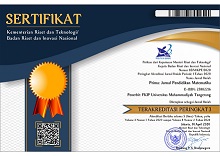META ANALYSIS: A METACOGNITION APPROACH TO STUDENTS' MATHEMATICAL PROBLEM SOLVING ABILITIES
Abstract
Problem solving is an important element in solving real life problems. When students are solving mathematical problems, students are faced with several challenges such as difficulty in understanding the problem because of problems that students have faced before. From the results of the teaching and learning activities that have been carried out, it can be concluded that the questions given to 36 students show that students' problem solving abilities are still low. The average obtained was 63.75 and classical completeness was 67%. Based on the results of the PISA survey in 2018, Indonesia was ranked 64th out of 65 countries that took part in the test. The aim of this research is to determine the increase in problem solving abilities using a metacognitive approach. This research uses a meta-analysis method by reviewing several articles in national and international journals. This meta-analysis is quantitative because it uses numerical calculations and statistics. This meta-analysis research uses 12 samples of relevant journals in national journals. Based on the results of the meta-analysis, it can be concluded that the articles that have been analyzed have an effect size value in the very high category of 17% of all articles, an effect size in the negligible category of 17%, an effect size in the high category of 17% of all articles. . The effect size in the medium category is 17% of the entire article. The effect size in the low category is 25% of the entire article. Based on the calculation results, the t_count value was 9.63 and the t_table value was 1.96; Thus the conclusion is obtained t_count=9.63>t_tabel=1.96. So H_0 is rejected. So, the average problem solving ability of experimental group students is more than the average of control group students.
Keywords
Full Text:
PDFReferences
Darma, Y. (2012). Efektivitas Strategi Heuristik dengan Pendekatan Metakognitif dan Pendekatan Investigasi Terhadap Kemampuan Pemecahan Masalah Matematika Pada Materi Pokok Barisan dan Deret Ditinjau dari Kreativitas Siswa Kelas XII Madrasah Aliyah di Pontianak (Doctoral dissertation, UNS (Sebelas Maret University)).
Desmita. (2014). Psikologi Perkembangan Peserta Didik. Bandung: Remaja Rosdakarya.
Elita G. N, Habibi M, Putra A, & Ulandari N (2019). Pengaruh Pembelajaran Problem Based Learning dengan Pendekatan Metakognisi terhadap Kemampuan Pemecahan Masalah Matematis. Mosharafa Jurnal Pendidikan Matematika
Hadiyanti, R. (2018, March). Analysis of mathematical problem-solving ability based on metacognition on problem-based learning. In Journal of Physics: Conference Series (Vol. 983, No. 1, p. 012157). IOP Publishing.
Hidayati, N. (2019). EFEKTIFITAS MODEL PEMBELAJARAN METAKOGNITIF DALAM PENINGKATAN KEMAMPUAN PEMECAHAN MASALAH MATEMATIK MAHASISWA DALAM MATA KULIAH PROGRAM LINIER. Prosiding Sesiomadika, 1(1b).
In'am, A., Mohammad, Z., & Jaludin, Z. Y. (2021). Effectiveness of the Metacognitive-Based Algebra Learning Model. Pedagogy Studies/Pedagogika, 141(1).
Lestari, H. N., Suganda, O., & Widiantie, R. (2017). Hubungan Antara Pengetahuan Metakognitif dengan Kemampuan Pemecahan Masalah melalui Model Problem Based Learning (PBL) pada Konsep Pencemaran Lingkungan di Kelas X. Quagga: Jurnal Pendidikan dan Biologi, 9(02), 23-31.
Nurmalasari, L. R., Winarso, W., & Nurhayati, E. (2015). Pengaruh kemampuan metakognisi terhadap hasil belajar matematika di SMP Negeri 2 Leuwimunding Kabupaten Majalengka. Nusantara of Research, 2(2), 133–147.
OECD. (2019, 05 15). PISA Result. Retrieved from Result-in-Focus: https://www.oecd.org/pisa
Özsoy, G., & Ataman, A. (2009). The effect of metacognitive strategy training on mathematical problem solving achievement. International Electronic Journal of Elementary Education, 1(2), 67-82.
Rizka, N., Hartoyo, A., & Suratman, D. (2018). Penerapan model PBL dengan pendekatan metakognitif untuk meningkatkan kemampuan pemecahan masalah matematis siswa SMP. Jurnal Pendidikan dan Pembelajaran Khatulistiwa (JPPK), 7(9).
Sholikhah, N., Winarti, E. R., & Kurniasih, A. W. (2014). Keefektifan model guided inquiry dengan pendekatan keterampilan metakognitif terhadap kemampuan pemecahan masalah. Kreano, Jurnal Matematika Kreatif-Inovatif, 5(1), 18-25.
Suratmi dan Agustina Sri Purnami. (2017). Pengaruh Strategi Metakognitif terhadap Kemampuan Pemecahan Masalah Matematis ditinjau dari Presepsi Siswa terhadap Mata Pelajaran Matematika. UNION: Jurnal Pendidikan Matematika Vol 5 No 2, Juli 2017
Sutarto, Dwi Hastuti, I., Fuster-Guillén, D., Palacios Garay, J. P., Hernández, R. M., & Namaziandost, E. (2022). The effect of problem-based learning on metacognitive ability in the conjecturing process of junior high school students. Education Research International, 2022, 1-10.
Syam, S., Rahman, U., & Nursalam, N. (2016). Pengaruh Pengetahuan Metakognisi Dan Gaya Belajar Visual Terhadap Kemampuan Pemecahan Masalah Matematika Siswa Kelas Ix Smp Negeri 2 Barombong Kabupaten Gowa. MaPan: Jurnal matematika dan Pembelajaran, 4(2), 231-244.
TIMSS. 2004. Highlights From the Trends in International Mathematics and Science Study (TIMSS) 2003. [Online]. Tersedia: http://www.warwick.ac.uk/ETS/Publications/Guides/cal.htm. [13 Nopember 2010]
DOI: http://dx.doi.org/10.31000/prima.v8i3.12107
Article Metrics
Abstract - 347 PDF - 351Refbacks
- There are currently no refbacks.
Prima: Jurnal Pendidikan Matematika
Program Studi Pendidikan Matematika
Fakultas Keguruan dan Ilmu Pendidikan
Universitas Muhammadiyah Tangerang
Jl. Perintis Kemerdekaan I/33, Cikokol
Kota Tangerang, Indonesia
e-mail: primajpm@gmail.com
Prima: Jurnal Pendidikan Matematika (p-ISSN: 2579-9827 | e-ISSN: 2580-2216) is licensed under a Creative Commons Attribution 4.0 International License.







